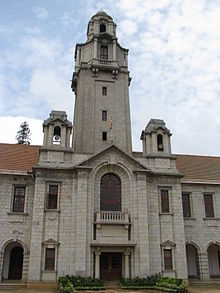Pinaki Majumdar
 From Wikipedia the free encyclopedia
From Wikipedia the free encyclopedia
Prof. Pinaki Majumdar | |
|---|---|
 | |
| Born | 26 January 1964 Calcutta, West Bengal, India |
| Nationality | Indian |
| Citizenship | India |
| Alma mater | |
| Known for | Studies on metal-insulator transition, High Tc Superconductors, Superfluidity, Ultracold Quantum Gases, Optical Lattices and nanoscale texture formation |
| Spouse | Gargee Majumdar |
| Children | Parananda Majumdar |
| Awards |
|
| Scientific career | |
| Fields | |
| Institutions | |
| Doctoral advisor | |
| Other academic advisors | |
| Doctoral students | Anamitra Mukherjee |
| Website | http://www.hri.res.in/~pinaki/ |
Pinaki Majumdar (born 26 January 1964) is an Indian condensed matter physicist and the director of the Harish-Chandra Research Institute. Known for his research on correlated quantum systems, Majumdar is a recipient of the Global Indus Technovator Award of the Massachusetts Institute of Technology. The Council of Scientific and Industrial Research, the apex agency of the Government of India for scientific research, awarded him the Shanti Swarup Bhatnagar Prize for Science and Technology, one of the highest Indian science awards, for his contributions to physical sciences in 2007.[1][note 1]
Biography
[edit]
Born on 26 January 1964 in West Bengal, Pinaki Majumdar graduated in engineering from Jadavpur University in 1986 and continued his studies at the Indian Institute of Technology, Madras from where he earned a master's degree (MTech) in 1990.[2] His doctoral studies were at the Indian Institute of Science and after earning a PhD in 1996, he did his post-doctoral work at Bell Laboratories, New Jersey for a couple of years. Returning to India, he joined Harish-Chandra Research Institute as a fellow in 1998. He has since held various positions at HRI such as those of a reader (2001–03) and an associate professor (2003–07) before becoming a full professor in 2007. He continues his association with the institute, holding the positions of the director and grade-1 professor.[3][4] He also serves as a professor at Homi Bhabha National Institute.[5]
Legacy and honors
[edit]Majumdar's research was mainly focused on disordered and strongly correlated quantum systems and his studies have assisted in a wider understanding of the metal-insulator transition.[6] He is also reported to have contributed to the studies of nanoscale texture formation and colossal response driven by external fields.[7] His studies have been documented by way of a number of articles[8][note 2] and Google Scholar, an online article repository of scientific articles, has listed 93 of them.[9]
Majumdar won the Institute Merit Prize and Silver Medal of the Indian Institute of Technology, Madras in 1990 when he passed out of the institute.[5] The Council of Scientific and Industrial Research awarded Pinaki the Shanti Swarup Bhatnagar Prize, one of the highest Indian science awards in 2007.[10] He received two awards in 2008; the Outstanding Research Investigator Award of the Safety Review Committee of the Department of Atomic Energy (DAE-SRC and the Global Indus Technovator Award of Massachusetts Institute of Technology.[11][12]
Selected bibliography
[edit]- Pinaki Majumdar, H. R. Krishnamurthy (1995). "Lattice Contraction Driven Insulator-Metal Transition in the d=∞ Local Approximation". Phys. Rev. Lett. 74 (3303): 1525–1528. Bibcode:1994PhRvL..73.1525M. doi:10.1103/PhysRevLett.73.1525. PMID 10056815.
- Pinaki Majumdar, Peter B. Littlewood (1998). "Dependence of magnetoresistivity on charge-carrier density in metallic ferromagnets and doped magnetic semiconductors". Nature. 395 (6701): 479–481. Bibcode:1998Natur.395..479M. doi:10.1038/26703. S2CID 204997491.
- Sumathi Rao (editor); Pinkai Majumdar (chapter author) (30 May 2002). "Quantum Many Particle Physics". Field Theories in Condensed Matter Physics. CRC Press. pp. 7–. ISBN 978-0-7503-0876-2.
{{cite book}}:|author1=has generic name (help)
See also
[edit]Notes
[edit]References
[edit]- ^ "View Bhatnagar Awardees". Shanti Swarup Bhatnagar Prize. 11 November 2017. Retrieved 11 November 2017.
- ^ "Biographical Information". Harish-Chandra Research Institute. 31 October 2017. Retrieved 31 October 2017.
- ^ "Director and Professor I". Harish-Chandra Research Institute. 31 October 2017. Retrieved 31 October 2017.
- ^ "Prof Pinaki Majumdar has been Appointed as Director HRI Allahabad". PSU Khabar. 30 March 2017. Retrieved 31 October 2017.
- ^ a b "Pinaki Majumdar - faculty". Homi Bhabha National Institute. 31 October 2017. Retrieved 31 October 2017.
- ^ "Brief Profile of the Awardee". Shanti Swarup Bhatnagar Prize. 21 October 2017. Retrieved 21 October 2017.
- ^ "Handbook of Shanti Swarup Bhatnagar Prize Winners" (PDF). Council of Scientific and Industrial Research. 17 October 2017. Archived from the original (PDF) on 4 March 2016. Retrieved 17 October 2017.
- ^ "On ResearchGate". 17 October 2017. Retrieved 17 October 2017.
- ^ "On Google Scholar". Google Scholar. 31 October 2017. Retrieved 31 October 2017.
- ^ "CSIR list of Awardees". Council of Scientific and Industrial Research. 2017.
- ^ "Materials and Energy Category". Massachusetts Institute of Technology. 31 October 2017. Retrieved 31 October 2017.
- ^ "Materials and Energy Category". Massachusetts Institute of Technology. 31 October 2017. Archived from the original on 8 February 2020. Retrieved 31 October 2017.
Further reading
[edit]- Pinaki Majumdar, Peter Littlewood (2008). "Magnetoresistance in Mn pyrochlore: electrical transport in a low carrier density ferromagnet (full text)". Physical Review Letters. arXiv:cond-mat/9708068. doi:10.1103/PhysRevLett.81.1314. S2CID 118977974.
External links
[edit]- Pinaki Majumdar (4 June 2013). "Thermal fluctuations in Fermi superfluids" (YouTube video). International Centre for Theoretical Sciences. Retrieved 31 October 2017.